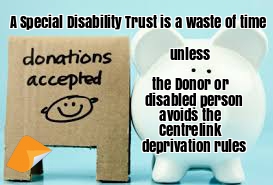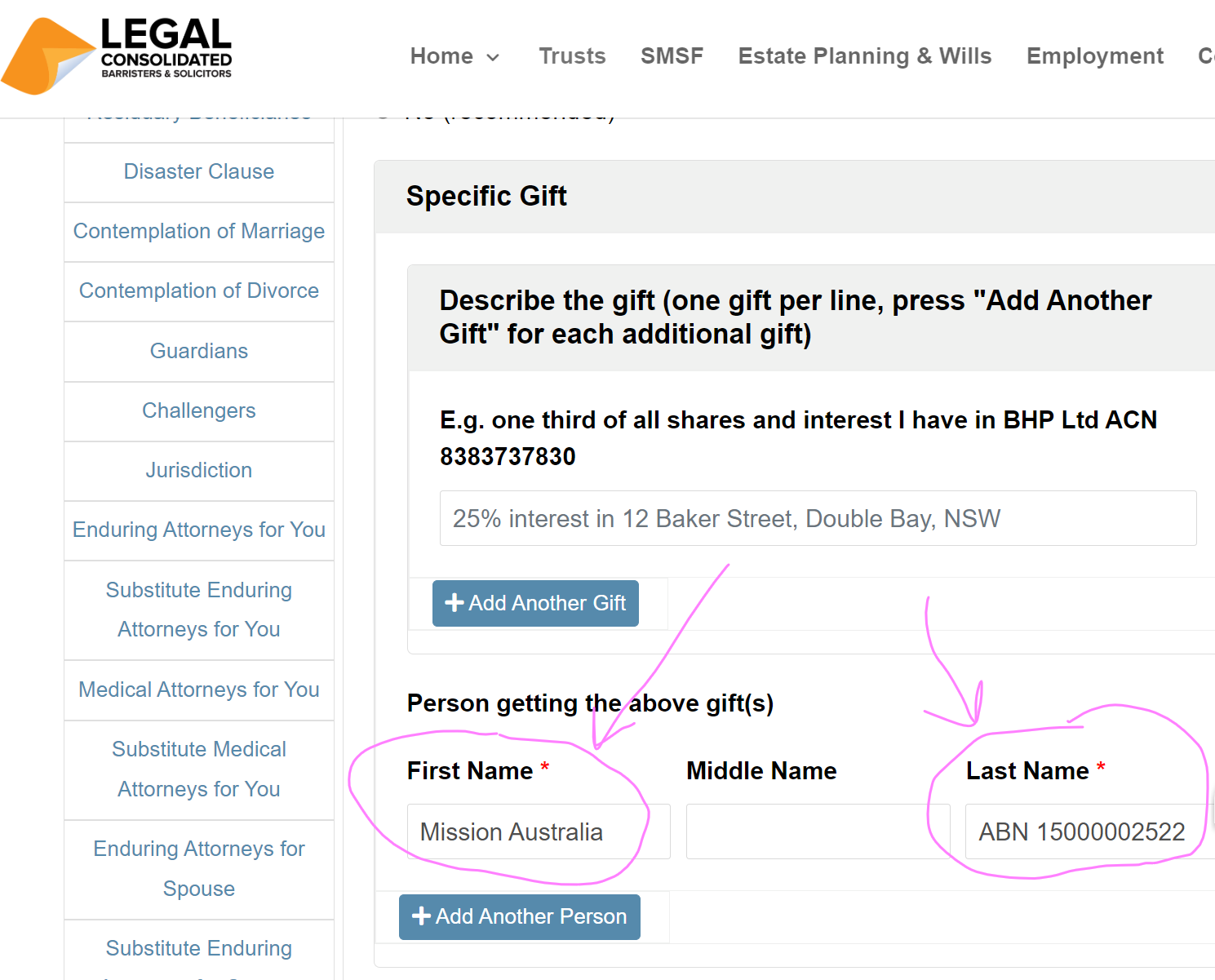Special Disability Trusts: Avoiding Centrelink Deprivation Rules
Unless you are specifically trying to avoid the Centrelink Deprivation Rules, a Special Disability Trust is often a complex administrative burden.
A Special Disability Trust (SDT) is a creature of statute. It is highly regulated, restrictive, and costly to audit.
Then, when the disabled person dies, the SDTs create significant complexity regarding tax and “vesting” rules upon the disabled beneficiary’s death.
However, Special Disability Trusts have one specific superpower:
They allow the giver of the funds (e.g., parents) and the receiver (the disabled person) to bypass the strict Centrelink Deprivation Rules.
If you do not need to avoid these Centrelink gifting rules, an SDT is a waste of money and time.
A 3-Generation Testamentary Trust in your Will is generally superior, more flexible, and imposes fewer government restrictions on how you spend the money.
“Should I put a Special Disability Trust in my Will?”
Yes, absolutely. But only as a “sleeping” option.
It is impossible to predict your assets or the exact government pension rules at the time of your future death. Therefore, all Legal Consolidated 3-Generation Testamentary Trust Wills automatically contain the power to activate a Special Disability Trust.
-
If the maths adds up: Your Executor activates the SDT to maximise Centrelink pensions.
-
If the math does not add up: Your Executor ignores the SDT and uses the flexible Testamentary Trust instead.
We give your family the tool, but we do not force them to use it if it doesn’t suit their needs at the time.
The only reason to have an SDT: The “Deprivation” Rule
To understand the need for a Special Disability Trust, you must understand how Centrelink views “gifts”.
Centrelink applies an Assets Test to the Age Pension and Disability Support Pension. The more assets you possess, the less pension you get.
You might think:
“I will give my money to my child or a trust. I then possess no assets. I get the full pension.”
Centrelink is harsh to parents with disabled children
Under the Deprivation Rules, Centrelink counts any gift exceeding $10,000 in a financial year (or $30,000 over 5 rolling years) as an asset. Centrelink deems you to still own that money for 5 years. So:
You give the money away. You can no longer use it to buy food. However, Centrelink still ‘deems’ you to own that money.
This creates a “double loss”:
-
You no longer hold the money.
-
Centrelink reduces your pension as if the money sits in your bank account.
How the Special Disability Trust escape the Centrelink deprivation rules
The Special Disability Trust is the exception to the Centrelink deprivation rules.
The government encourages you to look after your disabled loved ones. It offers a concession:
-
For the Parents (The Givers): You put money into an SDT for a “severely disabled” person. Centrelink ignores the Deprivation Rules (up to the current concessional limit). You transfer assets to the SDT. This potentially increases your Age Pension immediately. (You do not have to wait for time to pass.)
-
For the Disabled Person (The Receiver): The assets inside the SDT are generally exempt from the beneficiary’s own assets test. This helps them keep their Disability Support Pension.
Strict Government Restrictions on Special Disability Trusts
To access these Centrelink concessions, the Trust must comply with overly strict and complex rules:
-
The Trustee must spend the money only on “care and accommodation”.
-
The Trustee must limit discretionary spending.
-
The Trustee must perform expensive annual audits.
Legal Consolidated advises: If you do not need the Centrelink benefit, do not accept the burden of the Trust restrictions.
All our 3-Generation Testamentary Trust Wills contain Special Disability Trusts
Should all Wills contain a Special Disability Trust?
Yes. All Wills should contain the power to tip money from the dead person’s estate into one or more Special Disability Trusts.
Do all Legal Consolidated 3-Generation Testamentary Trust Will contain a Special Disability Trust?
All Legal Consolidated 3-Generation Testamentary Trust Wills contain Special Disability Trusts. Or, rather, the power to set up Special Disability Trusts.
They are automatically included as one of the many trusts in your Wills.
Your 3-Generation Testamentary Trust Wills contain many trusts automatically. These include Superannuation Testamentary Trusts to reduce the 32% death tax on your super going to adults and adult children. We also include Divorce Protection Trusts and Bankruptcy Trusts.
The Special Disability Trust is merely one of many trusts provided in a Legal Consolidated 3-Generation Testamentary Trust Will.
What if I do not want a Special Disability Trust in my Will?
You face 3 great uncertainties. You DO NOT KNOW:
- the date of your death (unless you have been diagnosed with a terminal disease or illness)
- what assets you will have at the date of your death. Your assets change every second of the day. Do you think you will never sell those BHP shares, your family home and the farm? Well, the BHP shares are split and then taken out by private equity in 2058 (ring me in 2058 if I am wrong). The state government compulsorily acquires the family home. And the farm is lost in a divorce settlement. Do not be churlish. Your assets change all the time.
- what the laws, taxes and death taxes are as of the date of your death. Superannuation will be abolished in 2059 (again, please ring me if I am wrong).
The above are the “Three Great Unknowns”.
If you have to narrow estate planning down to one word, it is “flexibility”.
To deal with the 3 above great unknowns, put as much flexibility in your Will as possible. The greatest form of flexibility in the 3-Generation Testamentary Trust. There is no rival.
Why do I need the power to set up Special Disability Trusts if I have no family members with disabilities?
Because of the above 3 Great Uncertainties, you can not say that. You do not know the hour of your death. You do not know anything at all about what is happening at the time of your death. We inject flexibility into your Will to allow for this lack of certainty.
Can my executors set up more than one Special Disability Trust?
Yes, of course. Your executors can set up as many Special Disability Trusts as needed in a Legal Consolidated 3-Generation Testamentary Trust Will.
The above third Great Uncertainty is that you do not know the law as of the date of your death. There may be asset protection, superannuation or Centrelink benefits in setting up more than on Special Disability Trust.
Can I delegate the job of running the Special Disability Trust to another person after my parents die?
Legal Consolidated 3-Generation Testamentary Trust Wills are structured for flexibility. So, the executors can delegate all or some of the jobs and responsibilities. This includes having other humans or companies being the trustee (or trustees) of the Special Disability Trusts.
We could tell you that two trustees are generally required, etc… But what is the point? The laws will be different by the time you die. The Legal Consolidated 3-Generation Testamentary Trust contains the maximum flexibility to deal with the changes in the law. This is not just from now to the date of your death. But there is also flexibility after you die as the Willmaker.
What happens when a disabled person dies? Can ‘leftover’ money go to my other children?
We do not know what the laws will be for Special Disability Trusts, but yes, at the moment, the Special Disability Trust is drafted so that any unused money goes back to your remaining children. However, this can be overridden by the Executors and maybe overridden by any future changes to the law. We can not see into the future, so we insert as much flexibility into your Will and the Special Disability Trust rules as possible.
Special Disability Trusts – useful for only one thing
Special Disability Trusts allow families to give private financial help. But this is only for a ‘disabled’ family member. This is for their care and accommodation. The family member must have a ‘severe’ disability.
Special Disability Trusts are usually a waste of money and time. They only serve one purpose. They stop the Centrelink ‘deprivation rules’ from operating. If you do NOT benefit from this protection from Centrelink, then do not waste your money and time setting up a Special Disability Trust (SDT).
Does Australia have a ‘gift tax’?
There is no ‘gift tax’ in Australia. You can always give money to another person. There is no tax on ‘gifts’ in Australia.
Why bother to set up an expensive and difficult-to-use Special Disability Trust?
The only benefit of an SDT is that both the donor and disabled person avoid the Centrelink ‘deprivation’ rules.
Special Disability Trust in Wills
All Legal Consolidated Barristers & Solicitors 3-Generation Testamentary Trust Wills contain Special Disability Trusts.
Special Disability Trust v other trusts
A ‘trust’ is a legal relationship between a trustee and a beneficiary.
The 12 most common trusts in Australia are:
Trusts in a Will (only start at your death):
- 3-Generation Testamentary Trust in Wills – to reduce Capital Gains Tax and stamp duty
- Super Testamentary Trust in a Will – stops the 32% tax on Super going to adult children
- Bankruptcy Trusts in a Will – if a beneficiary is bankrupt
- Divorce Protection Trust in a Will – if a child separates
- Special Disability Trust
Trusts not in a Will (they start immediately):
- Family Trust – common for asset protection
- Unit Trust
- Acknowledgement of Trust Deed – ‘AFTER the Trustee buys
- Gifting Trust – ‘deathbed declaration’
- Declaration of Trust BEFORE you buy – ‘secretly buy
- Bare Trust – ‘hide assets you own’
- Self-Managed Superannuation Fund – to control your super
How a Special Disability Trust work in Australia
In an SDT, the trustee looks after the trust property. This is for the disabled person:
- The trustee is often a parent or a family member. This is the ‘legal owner’.
- The beneficiary is their disabled relative, often a child or sibling. This is the ‘beneficial owner’.

For example, the beneficiary is the disabled son Tom. The trustee is his mother, Anne. Anne looks after the trust property for Tom. Anne is the ‘legal’ owner. Tom is the ‘beneficial’ owner.
When Special Disability Trusts started in 2006 you could gift up to $500,000 into the SDT. This maximum amount increases with the inflation rate each year.
You could put more money into the SDT. But, anything over the maximum amount is, of course, subject to the Centrelink Deprivation gifting rules. Which kind of defeats the purpose. The only reason you lock up wealth in such a complex, expensive and restrictive SDT is to avoid the deprivation rules.
Family members escape Centrelink’s deprivation rules and asset testing. This is when they put money into a Special Disability Trust. But this is only for the amount of money you put into the SDT.
But what are the Deprivation gifting rules? And why do they matter?
Young and Vulnerable Children tool kit
Free resources to help protect young and vulnerable children:
- Vulnerable children in Wills – watch the training course
- Loans to children – in case they divorce or go bankrupt
- Divorce Protection Trusts in Wills – in case a beneficiary, child or grandchild separates
- Making Wills for Your Children
- Elder Abuse – protecting the children as well
- Life Estates do NOT protect children
- Child renounces a gift or Family Trust distribution for Centrelink and stops Trustee-in-Bankruptcy
- Children paying 32% on your super when you die
- Only disabled children can take your SMSF Reversionary Pension
- Parent dies child pays 66% tax
- Dad’s Will: child vs charity
- Son loses the farm to his two smarter sisters!
- Disabled dad has $9m, two children and no Will – Statutory Will to the rescue
- Court rewrites disabled Dad’s Will to protect children
Centrelink Deprivation Rules for Special Disability Trusts
For example, Anne (mum) wants to get Centrelink benefits. But Centrelink benefits are means-tested. Anne has too much money, so she cannot get the pension.
Anne has, say, $700k over the amount of money she is allowed to have to get the pension.
Anne has to ‘get rid of’ $700k before she is eligible for the pension. She hands $700k to one of her children. ALERT: She is still taken to have that $700k in her name. This is for the next three years. This is called the Centrelink deprivation gifting rules. In other words, it is three years before Anne is eligible for the pension.
The gifting rules do not prevent Anne from making a gift to another person. There is no tax on gifts. And there is no tax when mum forgives a debt. Rather, the deprivation rules cap the amount that a gift reduces Anne’s assessable assets for means-testing.
There are two gifting limits applying to a single person (or to the combined amounts gifted by a couple):
- Up to $10,000 each financial year; and
- A limit of $30,000 over a five financial year rolling period.
The $10k and $30k limits apply together. Although Anne can continue to gift assets of up to $10k per financial year without penalty, she needs to take care not to exceed the gifting-free limit of $30k. This is over a rolling five-year period.
Again, she can gift more money. But under the deprivation rules, she is deemed to still have that money for the next 3 years.
/disabled-dad-court-will/
Special Disability Trusts escape the Centrelink Deprivation rules
Instead, pensioner Anne gifts the $700k into an SDT. This is for her severely disabled son, Tom. She:
- is deemed IMMEDIATELY to no longer have the money (no waiting 3 years)
- does not have to wait 3 years as she still has the money
- also, Tom is NOT means-tested for Social Security for the assets in the SDT.
Also, income from the SDT is excluded from the Centrelink income test. Also, deeming does not apply to the assets within the SDT.
If held in the SDT, Tom’s home is excluded from means-testing.
Obviously, Anne cannot gift the money directly to Tom. It has to be locked away in a Special Disability Trust to avoid the Centrelink Deprivation giving rules.
Social Security requirements to avoid deprivation rules – using Special Disability Trusts
A Special Disability Trust is a waste of time. This is unless the donor or disabled person escapes the deprivation rules. You often hear that the SDT provides ‘peace of mind’ and other meaningless cliches. No Centrelink deprivation advantage? Then there are cheaper, better, less restrictive trusts to achieve ‘peace of mind’ for a disabled person.
How to avoid the Social Security deprivation rules using Special Disability Trusts:
- The primary purpose of the SDT is ‘reasonable care and accommodation’ of the disabled person.
- SDT may have other purposes. But they are minor (e.g. ancillary) to the primary purpose.
- SDT has only one person – the disabled person (principal beneficiary).
- Section 1209M Social Security Act 1991 (Cth) ‘severe disability’:
- 16 or over:
- suffers an impairment that qualifies the disabled person for a disability support pension or equivalent
- meets the care conditions
- unable to work for more than seven hours per week for the minimum wage
- under 16:
- doctor certifies that the disabled person requires personal care for six months or more. And that a similar or increased level of care is required in the future.
- 16 or over:
- A special type of ATO and Centrelink complying trust deed (a ‘normal’ trust deed does not work).
- Independent trustee or more than one trustee.
- Investment Restrictions.
- Annual financial statements.
- Independent audits, if required.
Centrelink attacks grandparents mentioned in Family Trusts
See this article on Family Trusts vs Grandparents
11 free Centrelink articles to help you work with Centrelink
These free resources empower you to deal with Centrelink:
- Centrelink attacking innocent grandparents – mum helped children 20 years ago and now suffers
- Wind up Family Trusts
- Replacing the Appointor in a Family Trust – succession planning for a person wanting Centrelink
- Company to replace pensioner as trustee of a Family Trust
- Wind-up Unit Trusts
- Can beneficiaries disclaim a trust distribution?
- Abandon a gift in a Will to keep the pension?
- What to do before the end of year financial year – to appease Centrelink
- Centrelink compliant Power of Attorney – keeps your family in control, not Centrelink
- 3-Generation Testamentary Trust Wills – beneficiaries retain Centrelink benefits in your Will
- Loans to parents – not means tested by Centrelink
Special Disability Trusts require a doctor’s report
In our experience, to assess a person’s eligibility for Disability Support Pension, Centrelink requires a report. This is from the person’s doctor or specialist about their disability, injury or illness. Centrelink may also require the disabled person to undergo a Job Capacity Assessment. Can the person work? How much work can they do? How much help is needed to find and keep a job?
Centrelink does not make it easy for you, the Donor, or your disabled family member. Is it worth the effort? Rarely.
Assets test assessment vs Special Disability Trusts
For a Special Disability Trust, the disabled person is the only ‘attributed stakeholder’.
For the disabled person, all assessable trust assets up to the concessional asset value limit are exempt from the social security assets test. The concessional asset value limit was initially set at $500,000 on 20 September 2006. It is indexed on 1 July each year to the Consumer Price Index (CPI).
Any limit on the amount of money in a Special Disability Trust?
There is no limit on the value of assets in a special disability trust.
1. But, any money donated over the ‘concessional asset value limit’ suffers the deprivation rules for the person making the gift into the SDT. (To put in more money is silly.)
2. And also when the SDT goes over the ‘concessional asset value limit’ the disabled person suffers Centrelink means testing. This is on both capital and income. This is on the excess amount.
So here is another reason why an SDT is often a waste of time:
- If the disabled person has, say, $2m in their SDT then they are probably over the limit for Centrelink benefits anyway.
- Or, if they have say $2m in assets outside of the SDT then they are not going to get Centrelink anyway. So what was the point?
The 3 purposes of a Special Disability Trusts?
The restrictions on what you can spend the Special Disability Trust money on are draconian and unfair. The SDT can only pay for ‘reasonable care and accommodation’?
1. ‘Reasonable Care‘ in a Special Disability Trust:
-
- arises as a result of the beneficiary’s disability;
- medical and dental costs. (This includes private health fund membership, ambulance cover, medicines, surgery, specialist and GP services and daily care fees);
- expenses closely tied to their disability, including a modified car, sleeping and sensory aids and specialised food.
2. ‘Reasonable Accommodation‘ in a Special Disability Trust:
-
- arises as a result of the beneficiary’s disability, or
- the lease or purchase of a property for the beneficiary’s accommodation needs, or
- is for the payment of rates, taxes or maintenance of property that is owned by the SDT. But it is used for their accommodation, or leased at market value and the rent is used for their benefit
Sadly, the SDT cannot pay family members for giving care or to purchase or lease property from a family member.
3. Discretionary spending in a Special Disability Trust
There is a small concession to the above terrible restrictive rules.
The SDT spends a small amount of money each financial year on discretionary items. These are not related to the beneficiary’s care and accommodation. This is provided it is for the benefit of the disabled person. Discretionary spending includes the disabled person’s:
-
- health
- well-being
- recreation
- independence
- social inclusion
Since 1 July 2011, the amount that can be spent in a financial year on discretionary items is indexed annually.
Discretionary spending is initially set at $10,000 on 1 January 2011. It is indexed on 1 July each year to increase by the Consumer Price Index (CPI).
Benefits of a Special Disability Trust
- Future: Ensure that the ongoing needs of a disabled person continue, especially when the parents or a primary carer dies.
- Protects: The SDT’s trustee must safeguard and hold the assets for the benefit of the disabled person.
- Social security: A gifting concession up to the current indexed amount for:
- eligible family members of the disabled person; and
- an assets test assessment exemption for the disabled person.
- Tax: SDT’s net income is taxed at the disabled person’s tax rates and Capital Gains Tax exemptions.
However, points 1, 2 and 4 are not peculiar to an SDT. Cannot take advantage of point 3? Then there are better trusts to hold the money for the disabled person. Talk with your accountant and financial planner.
Alternatives structures to a Special Disability Trust
Special Disability Trusts are expensive and restrictive. They only serve one purpose to avoid the $10,000 annual gifting rules for Centrelink. Getting no benefit from the deprivation rules? Then talk with your accountant and financial adviser about a better structure. Consider:
- 3-Generation Testamentary Trust Will – flexible and tax-effective
- Family Trust – but you have to trust the Appointor
- Unit Trust – with the owner of the Units being a Family Trust
- Bare Trusts
- Loans to children
Donor in Special Disability Trust avoids Centrelink deprivation rules
Only ‘immediate family members’ avoid the gifting concessions. Immediate family members include:
- parents (including adoptive and step-parents)
- legal guardians
- grandparents
- brothers and sisters (including adoptive, step and half-siblings)
The disabled person or their partner can only use the gifting concessions under limited circumstances. This is where the gifted asset is received under a Will.
Every 3-Generation Testamentary Trust Will that you build on our law firm’s website automatically allows your executors to establish Special Disability Trusts. This is if required. This is for your children, grandchildren and great-grandchildren. It is for any beneficiary in your Will who is severely disabled.
Since 20 September 2006, families may establish a Special Disability Trust. It attracts social security means test concessions for both the disabled person and the donor. The $500,000 limit (as indexed since 2006) applies to all family members combined.
The gifting concessions only apply to ‘immediate’ family members. These are persons who are of Age Pension or Service Pension age and receive a social security pension. (They may also receive a pension after making the gift.) The concession does not apply to a person receiving certain other income support payments, such as Newstart Allowance.
Capital gains or losses from assets gifted directly to an SDT for no consideration are disregarded for tax purposes. The exemption applies to assets passing from a deceased estate to an SDT.
Family homes are CGT exempt in a Special Disability Trust
SDTs get the capital gains tax (CGT) main residence exemption. This is when you hold the disabled person’s home in the SDT. The 2-year (often 3 years) after-death exemption also applies.
This is a great advantage.
Retain income in the SDT and just pay normal marginal tax?
SDTs are taxed like other Australian trusts, such as family trusts.
But what if you do not distribute all the income to the disabled person? What if you retain some of the income in the SDT? Unexpended income is taxed at the disabled person’s marginal tax rate. For trusts, this is uncommon, but it is beneficial to the disabled person.
Normally, undistributed income in a trust is taxed at the highest marginal tax rate. See 99A Income Tax Assessment Act 1936. In other words, normally, you must distribute all income out of your trust. Otherwise, the retained income is taxed at the highest marginal human tax rate.
In the SDT you do not have to pay out the income. Instead, you can retain the income in the Special Disability Trust.
But if that is your only benefit from the SDT, is it worth the effort? Remember, the retained income is still taxable. The disabled person still has to include it in their tax return. It is not ‘free’ money.
Setting up a Special Disability Trust in your Will
A Special Disability Trust is available in your Will if you have a 3-Generation Testamentary Trust Will.
All Legal Consolidated 3-Generation Testamentary Trust Wills contain Special Disability Trusts. They sit in the Will dormant. After you die, they are turned on and off as your beneficiaries, children, grandchildren, and great-grandchildren require. However, they are only one of the many benefits of a 3-Generation Testamentary Trust Will.
Protects from death duties, divorcing and bankrupt children and a 32% tax on super. Build online with free lifetime updates:
Couples Bundle
includes 3-Generation Testamentary Trust Wills and 4 POAs
Singles Bundle
includes 3-Generation Testamentary Trust Will and 2 POAs
Death Taxes
- Australia’s four death duties
- 32% tax on superannuation to children
- Selling a dead person’s home tax-free
- HECs debt at death
- CGT on dead wife’s wedding ring
- Extra tax on Charities
Vulnerable children and spend-thrifts
- Your Will includes:
- Divorce Protection Trust if children divorce
- Bankruptcy Trusts
- Special Disability Trust (free vulnerable children in Wills Training Video)

- Guardians for under 18-year-old children
- Considered person clause to stop Will challenges
Second Marriages & Challenging Will
- Contractual Will Agreement for second marriages
- Wills for blended families
- Do Marriages and Divorce revoke my Will?
- Can my lover challenge my Will?
- Make my Will fair: hotchpot clauses v Equalisation?
What if I:
- have assets or beneficiaries overseas?

- lack mental capacity to sign my Will?
- sign my Will in hospital or isolating?
- lose my Will or my home burns down?
- have addresses changed in my Will?
- have nicknames and alias names?
- want free storage of my Wills and POAs?
- put Specific Gifts in Wills
- build my parent’s Wills?
- leave money to my pets?
- want my adviser or accountant to build the Will for me?
Assets not in your Will
- Joint tenancy assets and the family home
- Loans to children, parents or company
- Gifts and forgiving a debt before you die
- Who controls my Company at death?
- Family Trusts:
- Changing control with Backup Appointors
- losing Centrelink and winding up Family Trust
- Does my Family Trust go in my Will?
Power of Attorney
 Money POAs: NSW, VIC, QLD, WA, SA, TAS, ACT & NT
Money POAs: NSW, VIC, QLD, WA, SA, TAS, ACT & NT
- be used to steal my money?
- act as trustee of my trust?
- change my Superannuation binding nomination?
- be witnessed by my financial planner witness?
- be signed if I lack mental capacity?
- Medical, Lifestyle, Guardianships, and Care Directives:
- Company POA when directors go missing, insane or die
After death
- Free Wish List to be kept with your Will
- Burial arrangements
- How to amend a Testamentary Trust after you die
- What happens to mortgages when I die?
- Family Court looks at dead Dad’s Will

